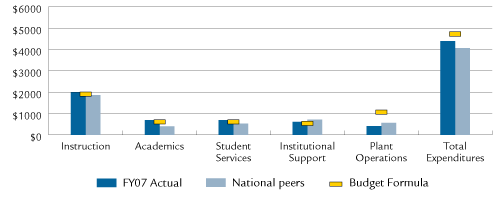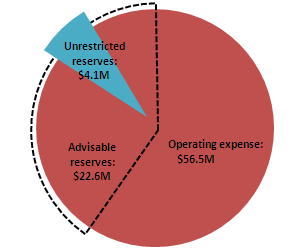North Shore Community College
North Shore Community College (NSCC) blends tradition and innovation, liberal arts and career preparation, intellectual development and cultural growth, creating a community of learners where all are welcome and each is challenged. North Shore offers lifelong education responsive to evolving technology, a global economy, and the shifting roles faced by individuals and institutions.
Program of Distinction
Collaborations
Access Indicators
Affordability Indicators
Student Success and Academic Quality Indicators
Fiscal Effectiveness and Efficiency Indicators
Program of Distinction
The Presidential Scholars Program is a unique leadership development program at North Shore Community College (NSCC) which recognizes high academic achievement and community service. Since 2006, the College has recognized 31 worthy graduating high school seniors and 10 returning scholars who meet academic and other eligibility requirements. This program provides financial support and academic and personal mentoring, as well as opportunities to serve as ambassadors for the President's Office and NSCC. The students have participated in social, public policy, community and fundraising initiatives of many stripes. Students have learned about networking, advocating for themselves, leadership skills and serving others. The program, which focuses on student success and retention, marks an important internal collaboration between Admissions, Student Life, and Institutional Advancement. For these students, the average GPA is 3.3 through the spring 2008 semester, and the group averages a 97% retention rate and 88% graduation rate.
Collaborations
- Under the leadership of VP Donna Richemond and with the support of the Public Policy Institute, the College collaborated with the Phoenix Charter Academy (PCA) in Chelsea. Phoenix is an alternative charter high school serving at-risk and teen parents from Chelsea, Revere and Lynn. Students at PCA attended a Student Success Seminar class at North Shore Community College one day per week and also on Saturdays at PCA during spring semester 2008 (earning three college credits) team-taught by VP Richemond and NSCC faculty. Coursework included college readiness skills, self-awareness, learning strategies, leadership skills and career development. Twelve students completed the course as a pilot; it is expected the model will continue at other community and alternative-based schools under the auspices of a dual enrollment program.
- In May 2008, NSCC graduated 19 students from its new Energy Utility Technology Certificate Program. This program was developed and implemented through collaboration with National Grid and two other community colleges, Middlesex and Quinsigamond, in response to a workforce demand for trained energy utility workers. Funding was provided from a Department of Labor grant and National Grid, whose employees were influential in developing the curriculum, including a practicum course at its training facility, providing scholarship money and marketing support. The Partnership includes working with the North Shore Workforce Investment Board, its Career Centers and the Northeast Public Power Association.
- In February 2006, the NSCC invited the Massachusetts Division of Energy Resources to survey the college as a potential Solar Photovoltaic site. The feasibility study concluded that the roof of the McGee building on the Lynn Campus is an excellent site. Working with the State Sustainability Program, The Mass Tech Collaborative (MTC) and Mass Development Finance Agency, NSCC applied and was one of six projects approved for federal funding for a 62.2KWH Solar PV installation. The $528,700 project will be funded by a $338,100 grant from the MTC. The remaining $190,600 will be funded by the Federal Government zero-interest loan program for Clean Renewable Energy and will be paid back from the energy savings from the project. Construction will begin in early 2009, and the solar panels are expected to produce 74,726 kWh on average annually, representing 3% of the building's electrical requirements.
- The College partners with three community programs through a grant (Navigating the Future) funded by the North Shore Workforce Investment Board (WIB) to bring at risk learners (studying for the GED or at alternative high school) to college-level achievement. Students take the Accuplacer tests at NSCC. College faculty teach a success seminar and a writing course at the three partner locations: Catholic Charities in Lynn; Training Resources of America in Salem; and Compass in Gloucester. The anticipated outcomes of this project are based on the assumption that with information, opportunities and support, participants will be more motivated to achieve their GED, begin their college career and better understand the value of post secondary education.
- The College partnered with five public community colleges and one state college as part of the Northeast Information Technology Across the Curriculum Collaborative. This was a Commonwealth Information Technology Initiative (CITI) funded partnership designed to prepare all graduates for work in the 21st century. Students will develop Information Technology fluency through embedded skill development within their own programs of study. NSCC will also develop an IT concentration available to all students at the college as part of their programs of study. In addition to NSCC, partners include Salem State College, MassBay Community College, Middlesex Community College, Northern Essex Community College and Roxbury Community College.
Section I: Access to Public Higher Education in Massachusetts
Access Indicators
Fall 2007 Enrollment
| Headcount |
7,107 |
| FTE |
4,362 |
Fall Enrollment
Over the last three years, fall headcount enrollment has increased 7.6%.
Over the last three years, fall full-time equivalent (FTE) enrollment has increased 7.8%.
Annual 2007–2008 Enrollment
| Headcount |
10,242 |
| FTE |
4,609 |
Annual Enrollment
Over the last three years, annual headcount enrollment has increased 5.8%.
Over the last three years, annual FTE enrollment has increased 7.8%.
Looking Back: Fall and Annual Headcount Enrollment

Fall 2007 Minority Enrollment
27.1%
Minority Enrollment
Lower than the minority representation of the institution's primary draw cities and towns (30.1%) but greater than the Northeast Region's minority representation of 14.5%.
Section II: Affordability of Massachusetts Community Colleges
Affordability Indicator
2007–2008 Tuition and Fees as a Percent of Median Family Income
4.6%
% of Median Family Income
Comparable to the Northeast regional average of 4.9%.
Looking Back: Tuition and Fees as a Percent of Median Family Income
|
FY2004 |
FY2005 |
FY2006 |
FY2007 |
FY2008 |
| North Shore Community College Tuition and Fees |
$3,390 |
$3,390 |
$3,480 |
$3,480 |
$3,630 |
| State Median Family Income |
$67,527 |
$68,701 |
$71,655 |
$74,463 |
$78,497 |
| "X" as a Percent of State Median Family Income |
| X = North Shore Community College Tuition and Fees |
5.0% |
4.9% |
4.9% |
4.7% |
4.6% |
| X = Massachusetts Community Colleges' Average Tuition and Fees |
4.8% |
4.9% |
4.9% |
4.7% |
4.7% |
| X = Northeast Average Tuition and Fees |
|
4.8% |
4.8% |
4.9% |
4.9% |
Section III: Student Success and Academic Quality
Success and Quality Indicators
Fall 2006 Cohort First-Year Persistence Rate
| Retained at original institution |
61.1% |
| Retained at any institution |
67.9% |
Fall Cohort First-Year Persistence
Persistence at original institution has remained relatively stable over the last three years and is above the segmental average of 56.5%.
Looking Back: Fall-to-Fall First-Year Persistence Rate

Fall 2003 Cohort Four-Year Overall Success Rate
70.6%
Fall 2003 Cohort Four-Year Individual Success Rates
| Earned Degree/Certificate |
34.3% |
| Transferred |
16.6% |
| Earned 30 Credits |
18.1% |
| Still Enrolled |
1.7% |
| Note: Each subsequent category excludes any student included in previous category(ies) |
Fall Cohort Four-Year Overall Success Rate
This new indicator measures students who have earned a degree/certificate, transferred to another institution, earned 30 or more credits, or are still enrolled after four years. Future reports will include these outcomes over four, five, and six years for this and successive cohorts. Please see the Technical Guide for further details regarding this indicator.
2007–2008 Fall-to-Spring Retention Rate
91.7%
Fall-to-Spring Retention Rate
Fall-to-spring retention has remained relatively stable over the last three years.
FY2008 Credit Course Completion Rate
71.9%
Course Completion
Below the Board of Higher Education's target rate of 75%.
Total Degrees Conferred in FY2008
985
Degrees Conferred
Average degrees conferred per year over the last three years: 922
Looking Back: Degrees Conferred

2007 Pass Rate on the National Nursing Licensure Examination
87.5%
Nursing Exam Pass Rate
Above the Board of Higher Education's target pass rate of 85%.
FY2008 Annual Enrollment in Workforce Development Courses
5,242
Workforce Development
Average annual enrollment in workforce development courses per year over the last three years: 5,318
Section IV: Effective and Efficient Use of Resources
Effectiveness and Efficiency Indicators
Effective Projects and Initiatives
- NSCC has utilized Banner ERP Finance web-enabled budget and online requisitions program. With 90 percent of staff trained, the implementation has resulted in improved operational efficiency and reduced costs.
- Working with the State Sustainability Program, the Mass Tech Collaborative (MTC), and Mass Development Finance Agency, NSCC received funding for a 62.2kWH Solar PV installation at the Lynn Campus. The $528,700 project consists of a $338,100 grant from the MTC and $190,600 from the federal government zero-interest loan program for Clean Renewable Energy, which will be paid back from the energy savings from the project.
- NSCC raised $441,520 through private fundraising, an increase over FY2007.
Resource Allocation
Expenditures per Student—Actual, National Peers, and Budget Formula

Note: This graphic was revised on May 6, 2009. The previously posted graphic displayed the data inaccurately.
FY2008 Primary Reserve Ratio
| Unrestricted Reserves (UR) |
$4,108,390 |
| Total Operating Expenses (TOE) |
$56,588,813 |
| Primary Reserve Ratio (UR/TOE) |
7.3% |
Primary Reserve Ratio

Compliance
No materials weaknesses based on annual external independent audit:

